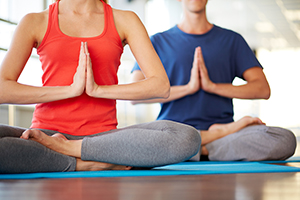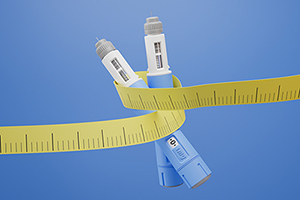



| By Dr. Ronald Hoffman
I told a patient the other day that I had decided to take up yoga. “You already do enough, Dr. Hoffman!” she exclaimed.
OK, I do a lot. I regularly run, bike or spin, swim, and do some strength training. I’ve lately picked up a weekly core strengthening class.
 I’ve sometimes said that, as an integrative physician, I’ve made my body a science fair project to “test-drive” modalities—diet, exercise, supplements, innovative use of medications, and lifestyle interventions—that might offer benefits to my patients, readers and listeners.
I’ve sometimes said that, as an integrative physician, I’ve made my body a science fair project to “test-drive” modalities—diet, exercise, supplements, innovative use of medications, and lifestyle interventions—that might offer benefits to my patients, readers and listeners.
But I’ve always given flexibility short shrift. Sure, I do some morning stretches prior to heading to the gym or hitting the streets for a morning run.
But as inveterate runners will attest, a one-note-Charlie approach to exercise is a recipe for inflexibility and injury, especially as you get older.
When it came to yoga, I’ve done a few classes here and there, usually while on a retreat vacation, or tagging along with family members.
Frankly, most of these those experiences have felt awkward and uncomfortable. I’m so used to proficiency and control in so many areas of my life that the challenge of putting a stiff body through challenging poses has taken me way out of my comfort zone.
I’ve often said that I’d rather do a ten-mile run in a downpour than to be put through a rigorous 90-minute yoga class—no contest!
And so it was that I voluntarily played to my weak suit and signed up for a series of one-on-one yoga sessions at the Y. My ultimate goal is to acquire enough proficiency that I can practice correctly at home, or feel capable of joining a beginner/intermediate yoga class anywhere without feeling terrified or looking ridiculous.
Actually, that’s part of it. Yoga is a great antidote to Western hubris. While straining to achieve tough postures, my limbs tremulous, I have to beat back the constant mental refrain that I’m not good enough. That is so antithetical to the true spirit of yoga, which is gentle acceptance, and to some extent, surrender.
The lesson of yoga, as I see it, is to enter a challenging zone and relax into it, with breathing as a tool. The idea is to be present, in the moment, and to suspend the brain’s maladaptive critical judgments.
Yoga is also about stemming the fear reflex, which is why it may be helpful in the treatment of anxiety. Stretches and contortions prompt the brain and body to clench reflexively. We do this all day long for our entire lifespans as we gird ourselves against the prospect of physical and emotional pain.
Yoga takes you gently to the threshold of your fear reaction and challenges you to push past your constraints—not forcefully (“No pain, no gain!”), but rather by relaxing and invoking the calmative power of the breath.
It’s not easy to do this after years of fear programming. I’m finding it very challenging. But it’s precisely for that reason that I feel I need to undertake this project at the tender age of 64 before “rusty suit of armor syndrome” and mental resignation close me irrevocably in their grasp.
Of note is that yoga is a great way to curtail out-of-control eating. It serves as a counter-balance to gorging on big portions of rich food, and provides a psychological template for self-control. Try doing postures involving abdominal twists with a full belly—no way!
And an evening yoga class is a far better way to unwind after a tough day than a couple of martinis.
Studies demonstrate yoga can control hypertension. I believe the effect of yoga on blood pressure is akin to that achieved with the Zona Plus device. Using a simple handheld apparatus, I’m convinced the Zona people have (intentionally or inadvertently) packaged the cardiovascular benefits of the yoga experience for non-yoga practitioners.
The firm, consistent pressure encouraged by the Zona Plus and various yoga stability positions like the Downward Dog or the horizontal plank encourage vagal tone that prompts vasodilation. The result is an autonomic “reset” towards a relaxed circulatory bed.
There is evidence that yoga may be beneficial for Post-Traumatic Stress Disorder (PTSD). It is currently being investigated by the Veterans’ Administration as part of a holistic program for returning vets that is designed to reduce dependency on ineffectual and habit-forming medications.
Yoga has become an indispensable tool for aging athletes like me to overcome progressive stiffness and injury susceptibility. I’m finding it a useful counterforce to the stress and concussion of high-impact and weight-bearing exercise.
Additionally, yoga offers an acceptable alternative for deconditioned persons, older individuals, or those with debilitating conditions (like chronic fatigue syndrome, Parkinson’s Disease, Multiple Sclerosis, or cancer) that preclude ordinary exercise.
Sciatica and spinal stenosis propel millions of Americans to the surgical suite, often with disappointing results. There’s not much I can tell callers to my radio show who are literally pre-op for back surgery other than it would have been nice to have undertaken spinal prevention with a lifelong program of yoga.
Sexual disorders affect millions of Americans and have spawned much suffering and a thriving segment of the pharmaceutical industry. Yoga has the potential to open up blocked energetic channels and reboot sexual performance.
Moreover, since age-related loss of balance hastens the “dwindles” for many seniors, yoga postures that emphasize stability (Tree Pose, Warrior Pose) are excellent for staving off immobility and forestalling fractures.
Activities of daily living like vacuuming, making the bed, gardening, putting in light bulbs, tying your shoes and playing with grandchildren are so much easier when you’ve laid the groundwork for successful aging with yoga.
It’s beyond the scope of this column to reprise all the numerous documented benefits of yoga. You can learn more about them here, here, and here. These articles are comprehensive and well-referenced.
As for my own yoga journey, I’ll let you know how it’s going . . .
Though we think of declining estrogen as the hallmark of menopause, it's actually common for…

Up to 12 percent of Americans have ulcers at some point in life. Peptic ulcers…
Gallbladder disease is a modern illness. An estimated 20 million Americans have gallbladder disease. The…

New, more powerful weight loss drugs: Drugs like Wegovy, Rybelsus, Ozempic and Mounjaro/Zepbound are revolutionizing…

According to the Lancet, autoimmune disease affects one in ten people globally and it’s now…

This past week we were regaled with headlines like: High levels of niacin may increase…

Leyla Weighs In: The Erosion of Trust in Nutritional Research

Our virtual voicemail is open 24/7, so there's no need to wait to submit your questions for Dr. Hoffman. Leave a message, and you may hear your question featured on the Intelligent Medicine radio program!